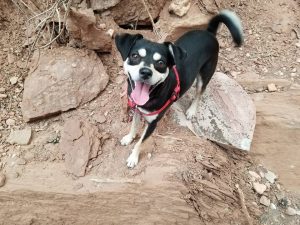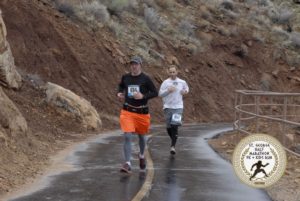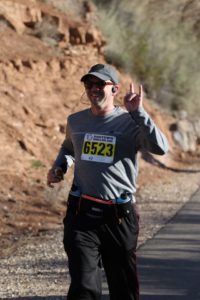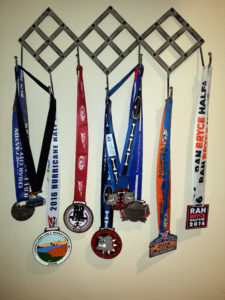I just finished a second draft of my current novel in progress. So … yay! This was my NaNoWriMo project (or, more accurately, my NaNoWriRunMo project), and I managed to cut 5,000 words while at the same time filling in a bunch of holes. One of the biggest gaps in the first draft happened to be in the final chapter. It had to be super clever, but when I drafted it I chickened out and pasted in a bunch of greeking because I was feeling extremely un-clever at the time. But that wasn’t going to work for my alpha readers, so it was time to knuckle down and crank something out—good or bad.
 So I harnessed up the dog, laced up my shoes, and went out for a run in the rain.
So I harnessed up the dog, laced up my shoes, and went out for a run in the rain.
This is something I find myself doing, more and more. Running and writing, writing and running. Maybe it’s just “thinking on my feet,” but my best inspiration always seems to come when I’m chugging away, breathing in rhythm, putting one shoe in front of the other. If I’m on a trail, the dog is gamboling ahead, making me look slow as she tears off after rabbits. If we’re street running, she’s dashing ahead to sniff whatever she deems sniffworthy, nose to the ground as I jog past, catching up as the leash zips back onto its spring-loaded spool. And all along, my mind is cycling around and around whatever I’m writing next.
I came back from that particular soggy run with most of that trouble section drafted in my head. It came to me in spurts between miles two and five. All I had to do when I got back was sit down and type it all out.
I’ve been a runner for much of my life, but I haven’t always run. Actually, there were entire years when I never ran at all—not even once. There were also years when I didn’t write anything apart from emails, shopping lists and Facebook posts. All that changed in early January of last year, when we adopted a shelter dog. Roxy loves to run.
Why Running and Writing?
If you’re a writer, I think you should be a runner too. Why? Amanda Loudin of the Washington Post sums it up this way:
Running and writing are at once complementary and opposing activities. Running requires a high level of physical activity; writing calls for a high level of cerebral activity. They are seemingly miles apart on the spectrum, but in reality, not at all.
For both, you need to consistently show up and practice. You need the mental focus to improve. You need to take risks and face potential failure. And you need to get comfortable with all of the above.
As a writer, there are four main benefits I have seen from my running: self-improvement, clearing my mind, running to read and learning to finish. Running and writing are amazingly complementary.
Self-Improvement
 When we adopted Roxy, it had been a couple of years since I’d attempted much serious exercise. I was the heaviest I’d ever been, and most of my pants were too tight to wear. (You see, I’m too cheap to buy new pants.) I would get winded climbing two flights of stairs. I was spending lots of hours in front of my laptop (often in fast-food joints) and that wasn’t helping things. I knew something had to change.
When we adopted Roxy, it had been a couple of years since I’d attempted much serious exercise. I was the heaviest I’d ever been, and most of my pants were too tight to wear. (You see, I’m too cheap to buy new pants.) I would get winded climbing two flights of stairs. I was spending lots of hours in front of my laptop (often in fast-food joints) and that wasn’t helping things. I knew something had to change.
Over 1,700 miles later, I’m 20 pounds lighter and I feel better than I have in decades. My body fat percentage is down a whopping 25%, year over year. Inspired by my best friend, I ran my first half-marathon last July. Since then, I’ve run seven more—eight if you count the “Double Dog Dare” a few weeks ago. I’m signed up for my first OMG-WTF-26.2-mile marathon in a month or so, and I couldn’t be more excited. At age 47, I’m in better physical shape than I was at 27.
Japanese author Haruki Murakami, a former three-pack-a-day smoker who’s now a triathlete and ultramarathoner, probably said it best: “For me, running is both exercise and a metaphor. Running day after day, piling up the races, bit by bit I raise the bar, and by clearing each level I elevate myself. At least that’s why I’ve put in the effort day after day: to raise my own level…. The point is whether or not I improved over yesterday.” When he says all of this, he’s talking about both running and writing.
I don’t think you necessarily need to race to be a runner, but it certainly doesn’t hurt. For me, races are just bright points on the calendar, like the semi-artificial deadlines you set for yourself to finish your first draft by X, your next draft by Y. Races are like write-ins where everyone wears Spandex. You all get together and socialize, and then you strap on your shoes and get to work. In racing, as in writing, you’re really only competing against yourself. If you finish, you win.
Clearing Your Mind
Poet, novelist and playwright Joyce Carol Oates drew an interesting comparison between dreaming and running:
There must be some analogue between running and dreaming. The dreaming mind is usually bodiless, has peculiar powers of locomotion and, in my experience at least, often runs or glides or “flies” along the ground or in the air…. In running, “spirit” seems to pervade the body; as musicians experience the uncanny phenomenon of tissue memory in their fingertips, so the runner seems to experience in feet, lungs, quickened heartbeat, an extension of the imagining self.
In the past year, most of my best ideas for characters and story elements have come to me while I pounded the pavement or crunched along a trail. I don’t carry a notepad while running, so I’ve learned to record these flashes of inspiration using a voice recorder app on my phone. My experience is far from unique. In his piece on writing and running, Author Ryan Holiday tells an eerily familiar story:
The introduction to my book The Obstacle is the Way came to me on a six mile run along the water on the east side of Manhattan. It was cold. I could see the breath coming in and out in front of me. I’d been struggling to figure out how to start this book for nearly a month and my timeline would fail apart if I didn’t make progress soon. Then suddenly, music blaring, some forgotten song on loop, it came to me: “In the year 170, at night in his tent on the front lines of the war in Germania, the Emperor Marcus Aurelius sat down to write.” The rest of the introduction followed over the next few miles….
Even if you don’t decide to take up running, you should at least consider taking up walking. There’s a reason so many writers—from William Wordsworth and Charles Dickens to Nassim Taleb and Stephen King—have turned to walking to improve their prose and verse. As Henry David Thoreau put it, “Me thinks that the moment my legs begin to move, my thoughts begin to flow.”
Nailed it, Henry David.
Running to Read
 Sometimes it’s difficult to read when you’re writing. There are only so many hours in the day, and it often comes down to a choice between one or the other. Here’s a tip: Choose to write. Later (or earlier), you can choose to run … and take an audio book along with you.
Sometimes it’s difficult to read when you’re writing. There are only so many hours in the day, and it often comes down to a choice between one or the other. Here’s a tip: Choose to write. Later (or earlier), you can choose to run … and take an audio book along with you.
I keep track of every mile I run using the MapMyFitness app. Unfortunately, I haven’t kept track of all the books I’ve absorbed during those miles. Just in the past year, the number would be in the dozens. I’ve always enjoyed audiobooks during long trips because they keep me engaged and actually encourage me to keep driving. (“Can’t stop for long … I’m in the middle of an important chapter!”) Audio books are another way I encourage myself to get out and run. I want to hear what comes next. To do that, I have to get outside and get going.
I also sometimes listen to podcasts while running. Last spring, I binge-listened to the first nine seasons of Writing Excuses while the dog and I cranked out the miles. I like to joke that, for a while, Roxy started thinking her name was “Shut up, Howard.” Now that I’m caught up, I save a few months’ worth of podcasts and listen to them on a good long run.
So load some audio books or podcasts onto your phone, invest in a good set of Bluetooth headphones, and enjoy guilt-free reading time that makes you fitter, not fatter. That’s a win-win, right there.
Learning to Finish
 It’s easy to start a novel. It’s a lot harder to crank away at it, day after day, until you have a completed draft. Similarly, it’s easy to start to run. (My teenaged daughter did that once. It didn’t take.) It’s a lot harder to work it into your personal routine, sacrifice sleep and TV time to get in your miles, and hit whatever personal goal you’ve set for yourself.
It’s easy to start a novel. It’s a lot harder to crank away at it, day after day, until you have a completed draft. Similarly, it’s easy to start to run. (My teenaged daughter did that once. It didn’t take.) It’s a lot harder to work it into your personal routine, sacrifice sleep and TV time to get in your miles, and hit whatever personal goal you’ve set for yourself.
One reason I prefer out-and-back routes is that they force you to actually return to where you started from. Each mile you run out is actually two miles, because you’ll have to essentially “un-run” it on the way back. If you’re just running laps around a track, you’re never really committed to the long haul, because you can walk away at any time.
Novels are like out-and-back courses. Once you set off, you need stamina to finish. If you don’t, you’ll end up with a bunch of unfinished projects in a drawer or on a hard drive. Finishing takes discipline, and discipline is developed through work.
When I was getting ready to run my second half marathon (in Parowan, Utah), I felt a lot more prepared than I had been for my first. I’d run a lot more miles, for one thing, and I’d actually run the first 10 miles of the course the week before the race. On the day of the half, my body and mind were both ready. I took off with 300 other runners and set a pretty fast pace. When I turned left to buttonhook through the city of Parowan, I was still feeling pretty confident. Then I hit the final two miles and the grade went from a gradual downhill to a subtle uphill. This was uncharted territory that I hadn’t encountered during my training. I didn’t give up, though, and pushed through and finished with a time almost eight minutes faster than my previous half.
We’ve all hit that point in our writing, haven’t we? Things are sailing along smoothly and suddenly you’re lost and don’t know how to finish. One of most fundamental lessons you’ll learn from running is that finishing requires perseverance. It’s an obvious thing, but a concept we have to learn over and over again before it really sinks into our souls.
Get Started Now
The only way to be a writer is to write. The only way to be a runner is to run. Put running and writing together and you’ve got a potent combination that improves your mind, body and craft. In the words of Nick Ripatrazone, “The steady accumulation of miles mirrors the accumulation of pages, and both forms of regimented exertion can yield a sense of completion and joy.”
If you’re a writer and you want to add the joy and accomplishment of running to your writing-focused life, I encourage you to download one of the many “Couch to 5k” (C25K) apps available for both iPhone and Android. Install one on your phone and then follow the program. You might be surprised at how much you enjoy it. You might be actually shocked at how much your writing improves.



